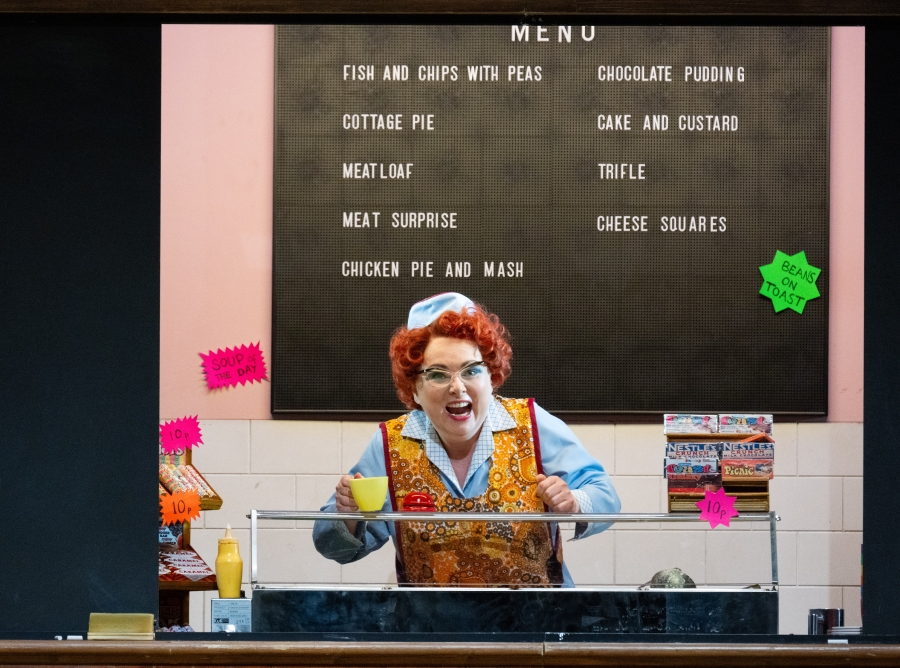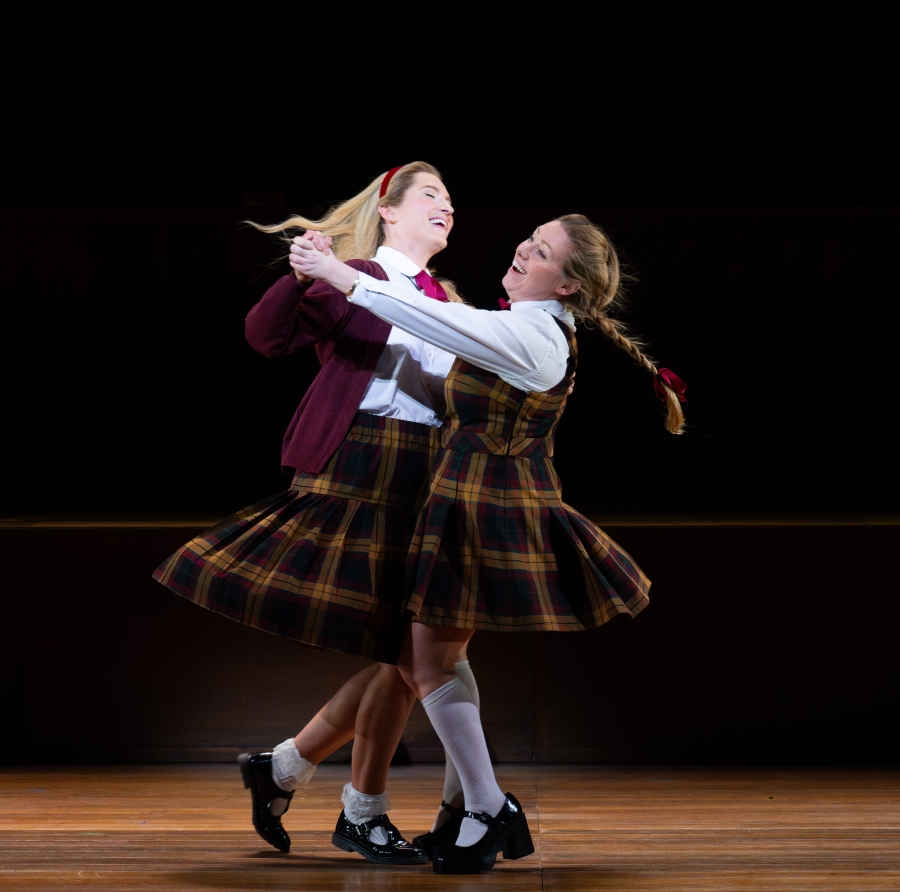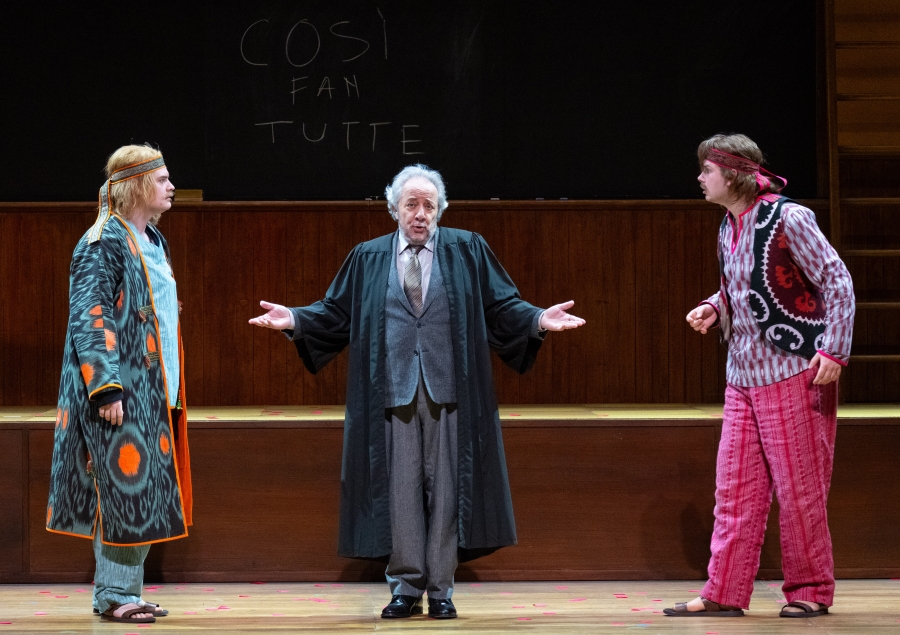More than titular accuracy may have encouraged director Max Hoehn to set his new production of Mozart’s Cosi fan tutte for Welsh National Opera in a school. Despite its sublime music, the comedy has at its core some assumptions concerning human intercourse: namely, the belief that women temporarily beyond the watch of their menfolk will throw fidelity to the winds when prey to the amorous attentions of others – in Lorenzo da Ponte’s libretto, their swains improbably disguised. Today, this is political incorrectness of a high order.
The full title of da Ponte’s story on which the opera is based is Cosi fan tutte, ossia La scuola degli amanti (‘All Women do the Same, or The School for Lovers’) hence Hoehn’s chosen setting. Truth be told, it’s a school that clearly places a huge emphasis on human biology and anatomy and where the hormones of puberty are simmering. Jemima Robinson’s ubiquitous backdropped set encompasses the opera’s performing space that includes oversize portrayals of genitalia, typically modified by the kids with smutty inventiveness. There are also references to the Garden of Eden.
Don Alfonso, sung with deep-seated authority by José Fardilha is a cynical and scheming schoolmaster; Rebecca Evans sings like the experienced Mozartian she is as Despina, a fussy dinner lady as well as Alfonso’s co-conspirator; and the WNO Chorus are got up in the shape of Billy, Bessie and Sammy Bunter but, of course, sing with adult vigour.
The story applied universally is regarded by feminists and others as outrageous. Certainly suspicions of what men would get up to in their woman’s absence would be more justified by a feminist-dominated argument; but objection should work both ways. Temporal shift should be the least of an opera director’s considerations in Cosi fan tutte. Although an opera buffa, it prompted Mozart to explore depth of character at odds with its nominal frippery, but that was Mozart’s strength: a sense of fun just obscuring the deadly serious, even the tragic, in its depiction of the treatment of women by men. (In these days of gender fluidity, the situation would be complex but still possible.)
It’s important to mention all this for two reasons: first, WNO itself deals with it at length in an introductory programme note, explaining how dislike of the opera’s lack of respect for women goes as far back as the time of its first performances; and second, Hoehn’s updating to a modern school, albeit with fantastical, not to say farcical, goings-on, might introduce further unease. In an opera about manipulation and ensnarement, and a society – ours – in which abuse of the young by those charged with supervising them is all too familiar, the sight of a teacher hovering with intent over his ‘young’ charges in school uniform, and in cahoots with someone, is faintly disturbing. Also, the ensuing narrative, in which the two women are duped into thinking their loved ones have been conscripted and the loved ones return in disguise, each to woo the other’s fiancé, is an extra-curricular flight from reality.
Rebecca Evans
The production, with the WNO orchestra under Tomáš Hanus in terrific form, scores in the tightness and living presence of the ensembles and the delivery of music so ravishing that it almost floats away from the comedy – most of it milked by Evans in doubling her character as the fake doctor and notary but also elsewhere as Ferrando and Guglielmo return dressed like renegades from Woodstock. Mark Jonathan’s lighting design and Michael Spenceley’s choreography enhance the scenes.
Kayleigh Decker and Sophie Bevan
Egor Zhuravskii, José Fardilha and James Atkinson
Egor Zhuravskii as Ferrando and James Atkinson as Guglielmo strike the right balance between poignancy and artifice – they stand to win a bet if Don Alfonso is proved to be wrong. In Hoehn’s version, they leave as sailors as the grand deception begins. That gives the consummate farewell trio, Soave sia il vento, a slightly corny emphasis, but nothing can infect Mozart’s weightless music. After the first disguised encounter with the sisters, Atkinson’s self-reflecting aria Non siate ritrosi, ochietti vezzosi in the third scene of Act One contrasts with Zhuravskii’s following Un’aura amorosa in one of the opera’s many instances of character contrast. It’s the same with Sophie Bevan’s Fiordiligi and Kayleigh Decker’s Dorabella, their sisterhood affirmed in the duet Ah guarda sorella, their divergent character delineated in succeeding arias, earnestly despatched.
In its early days, the opera must have been a diversion and the objections to it would surely have included the view that Mozart had wasted inspired music on an unworthy tale. The final celebration of Alfonso, Ferrando and Guglielmo of the ‘truth’ of distaff infidelity is an offensive act that makes them appear uncouth. In this production, the school setting might have been employed to offer a different ‘lesson’. But by the end the fantastical and the farcical win the day, leaving the central problem…well, still central. It’s a comedy, but the laughs are no longer easily won.
There are further performances in Cardiff on March 2, 6 and 8 and thereafter at Venue Cymru, Llandudno March 14, 16; Mayflower, Southampton March 21, 23; New Theatre, Oxford March 27; Hippodrome, Bristol April 24, 26; Hippodrome, Birmingham May 10.
Tour dates, venues and to book: https://wno.org.uk/whats-on/cos%C3%AC-fan-tutte-mozart#venues-and-tickets
Images by Elliott Franks


